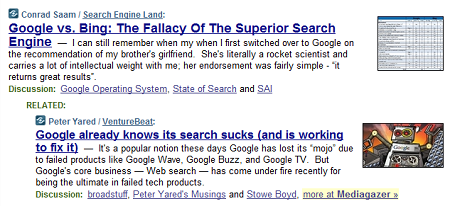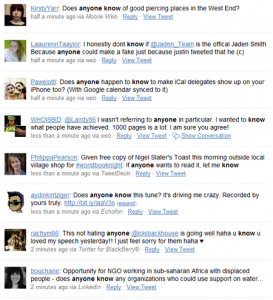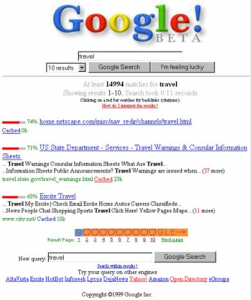 Good morning, good morning, GOOD MORNING! We’re back at SMX West for Day 2 and greeting us is Danny Sullivan. He’s going to chat about the state of search marketing. I’m a big fan of the evening chat sessions Danny used to do so hopefully this will be just like those. It better be because SMX loaded me up on sugar for breakfast so…it’s on. Or maybe I loaded myself up with sugar for breakfast. Who can even tell anymore? But that doughnut was delicious.
Good morning, good morning, GOOD MORNING! We’re back at SMX West for Day 2 and greeting us is Danny Sullivan. He’s going to chat about the state of search marketing. I’m a big fan of the evening chat sessions Danny used to do so hopefully this will be just like those. It better be because SMX loaded me up on sugar for breakfast so…it’s on. Or maybe I loaded myself up with sugar for breakfast. Who can even tell anymore? But that doughnut was delicious.
Okay! Danny’s presentation is 66 slides of photos. Which means he’s basically trying to kill me as I attempt to keep up with him. Ready to come along with me? Hang on, friends.
Danny starts off apologizing that he won’t be talking much about paid search. Eh, whatever. No one cares about paid search anyway. We start with the pictures.
Search used to be cool. The new cool is the Facebook movie and Justin Timberlake and Charlie Sheen drinking chocolate milk with his goddesses. Who really cares about search? It’s all going away, blah blah blah. Just kidding.
Search being on The Colbert Report was pretty cool. We’re back in the news now. Danny talks for a bit about how Google got on Colbert report in light of Google’s claims that Bing was copying its search results. Danny calls it a “shit hot story” and then apologizes for calling it that. Regardless of what’s going on, the bigger point is that search is back, baby! People are talking about it and they’re interested in it again. We had search engineers doing search missions honeypot style. People have been talking and its been like that for two months now. The search headlines are picking up. Woohoo!
The beginning of the year looked like this



Then, in January, Google told everyone to shut up – we’re working on it, we’re making changes, and we’re a lot better than we were in 2000. And that makes top of Techmeme again and people are all talking about it. Then they release an extension for Chrome to help you block sites you don’t want to see. [Blekko was in the background yelling, hey, we do that too!] Then they roll out the Farmer/Panda update and everyone’s talking about it and Danny’s getting calls on vacation. People are talking about search and it’s a big deal. The reality is that search never went away, people didn’t stop searching. We’re searching more than ever before. We just took it for granted until we thought we were maybe going backwards. And that made us angry.
It made us angry because people care about search. All of this is coming at a time when we’ve had unprecedented change. He keeps getting surprised.
- Google Places spreads out in October of 2011, giving physical locations much more prominence in the search results and ousting “regular listings”.
- The New York Times did a big profile on Decor My Eyes who was getting people to write negative reviews by being a jerk and claiming it was helping him rank in Google. Five days later Google makes a huge algorithm change in response to the story. Again, people are all talking about search.
- In January Stack Overflow claims people are scraping their content. 25 days later, Google responds to address it.
- Three weeks later we see the Farmer/Panda update.
Immediately after the Panda update, Danny says lots of people commenting on how wonderful it was…within seconds of it being announced. Did they do testing? No. But it made people feel better. He thinks Google made some fundamental changes to the benefit to the search results. He doesn’t think it was just a PR move. But there’s an element here that sounds like the emperor’s new algorithm. He did a query for [how to blend pictures in powerpoint] a few days ago – the first result was a sucky eHow page (though, according to Danny, not ALL of eHow’s content sucks]. And the result of the SERP wasn’t any better. The second result was irrelevant, the third was about PowerPower 2003, the fourth result was okay, the fifth was bad, the next was a dupe, then irrelevant, bad, irrelevant, bad, etc. It’s a mess.
And that’s the danger. When you get rid of all your content farms, suddenly there’s not enough content to show and you start showing completely irrelevant pages. Other queries may be improved, but there’s still plenty of bad stuff when you do searches for questions. And that stuff isn’t spam – which is why Google struggled with it. They know how to get rid of spam, but how do they get rid of content that simply doesn’t answer the question or isn’t satisfying?
It’s not just a Google thing. Bing had the same sucky results and so did Blekko. You can go through them later on. It’s not that this is a Google issue, it’s just that Google is the biggest of the lot so they take the most heat. In the Emperors New Algorithm, perception can beat reality. There has been some improvement, but he suspects this will be for Google what nofollow was for comment spam. Google and other search engines have long used links to find out what the best pages were across the Web. Then people starting spamming blogs to get links and bloggers were confused, looked at Google to fix it. Google came up with the nofollow attribute so that bloggers could apply them to links they didn’t want to get credit. Lots of bloggers used it and they stopped complaining about it. It didn’t stop blog spam, but it got it off Google’s back. No one screams at Google about blog spam anymore. Similarly, the Panda update may help diffuse the content farm problem which was probably overblown as a problem to begin with.
What’s will we fix next?
Danny mentions JC Penney’s link buying fiasco. Apparently people will try to buy links to inflate their rankings. SHOCKING! The New York Times discovered this and wrote a front page story. It was a great story, but it wasn’t anything new. Normal bloggers just don’t cover it because they’re not the NYT and don’t want to get claimed. But now no one will buy links! The world is safe for Google! Not. People are still buying links. It’s going to keep happening. The problem isn’t diffused. Maybe, finally, some big brands will decide that they have to stop doing that. More likely is that they’ll continue to be like JC Penney and pretend they didn’t buy links. They’ll keep hiring chump SEOs they can throw out the next time they get caught.
Pension Links: Sites that got a lot of links from the past because they were created in 1908 and now they’re really powerful. They’re just kind of kicking back and retiring, they can write whatever they want. New sites are coming along and trying to figure out how they compete in this space. There’s nofollow madness. Wikipedia can’t show love to external sites. We need OughtToFollow links to reward people that deserve it. But that’s gone now. And when that’s gone, the entire system starts breaking out. The way you fix the system is a lot of duct tape. You can fix all sorts of things with duct tape. The people on Mythbusters built a sailboat but these are not permanent solutions. We’re desperately seeking new signals.
We know the old signals…
- Words in the title tag
- Words on page
- Anchor text
- quality of links
- domain authority
But what ELSE can be used? What else can be put in the mix? He thinks we’re going to see more Search 3.0 as went local, news, video, images, shopping.
In Search 4.0, Danny talked about how human signals would be used in some way.
October 2010: Bing closed a deal with Facebook where they’re getting all the Facebook data and they’re using that to customize your search results. Its the kind of thing that has made people like Robert Scoble go NIRVANA and make people like Steve Rubel yell that SEO is dead. In December 2010 he spoke to both search engines to see if they’re using social signals in regular results to calculate the authority. Turns out it’s actually impacting our regular search results.
In February 2011, Google took its social search results and integrated them into the regular search results, not just shoving them into a box at the bottom of the page. Bing did the same thing a week later. Social has arrived. Facebook shares things all the time. Soon “likes” are gonna be “Zucks” and Zucks will count even more.
Danny talks about the Anyone Know search about how people should be using social data.

Instead of searching for [dominos] if you’re Dominos do a search for [pizza] and answer those questions. This is personal search marketing. It’s what people do on search engines all day long. They type in queries asking for help. Now they’re doing it on Twitter and you get to see their face. People are looking for answers. that’s what search is about.
Before Search Engines we asked family, friends, experts, researchers, etc. It was time consuming to get consensus. Then we got the search box. It’s disappointing how under-appreciated search is. Search is revolutionary. It’s fast, consensus-like, trustworthy and confidential. It wasn’t always that good in some of the answers and it wasn’t good if your question was subjective. Social networks have digitized people, making them searchable. How does search integrate us?
- December 2009 – Google launches personalized search for everyone. No one cares.
- February 2011 – Last month Bing announced they were personalizing all their results. No one cares.
People lose their minds over a one-time update, THAT’S attracting the attention of the Wall Street Journal, but Bing continues a trend of personalizing everything and it makes a small bump. There are no more normal results.
So SEO is Dead. Danny says thank you and pretends to walk off the stage. Hee. Really, he’s just getting water.
Some of the core results always stay the same – vertical opportunities, social is both personal and general. The results aren’t the same, but there are commonalities.
- Good News: SEO is alive
- Bad News: People still hate us
Nothing’s going to kill SEO. Danny’s exhausted by the conversations and he encourages people to ignore them. When ignorant people are talking about what SEO is and isn’t, why give them that time than to respond? They’ve sucked up enough of our life. Danny quotes his post on SEO Is Here To Stay noting he knows there are a lot of SEO haters out there who wish this were so, but that hate comes from a fundamental misunderstanding of what SEO is about. If you misunderstand something so much as to hate it, you surely have no understanding about its future. Wise.
No, SEO is not about tricking search engines, nor spamming links, nor ruining web design. SEO is here to stay. It’s about building good content, understanding the ways people might seek it — including the words they might use — and ensuring the content is search engine friendly along with being human friendly.
Danny talks about the Watson computer, made by some folks who attend RPI LOCATED IN TROY, NY! (#justsayin). He says it was pretty awesome. Danny says he couldn’t enjoy it because he knew Watson is a joke compared to Google. Watson answered questions in 3 seconds. Google could answer a series of questions in that time. The search engines are creatures we take for granted.
Danny says we’re part of the continuing search revolution. Be proud! Feel good about yourselves.
Wow. That was a lot to take in. Thanks to Danny for another awesome keynote. I’m on to the next session!


